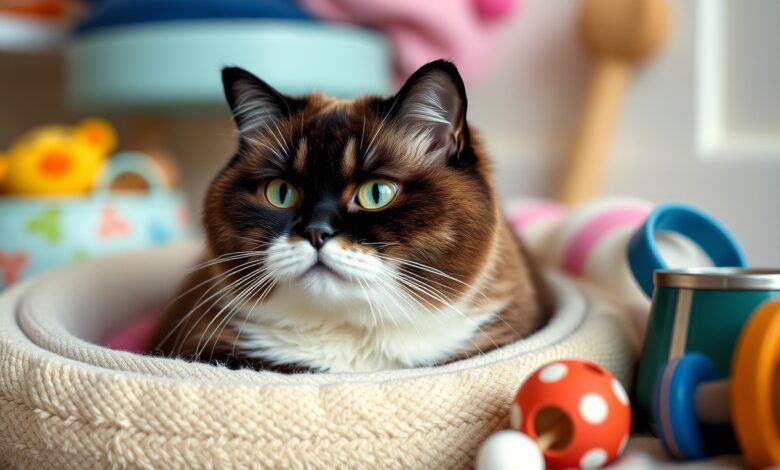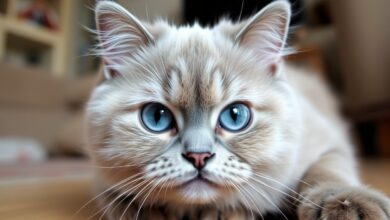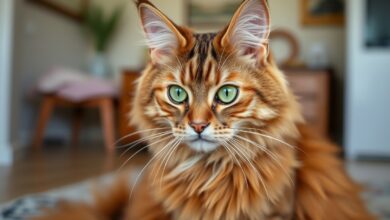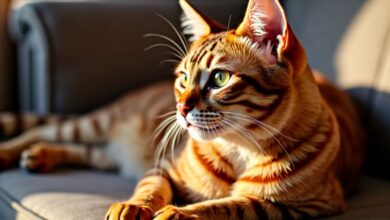10 Things to Know Before Buying an Exotic Shorthair Cat

It’s important to understand what to expect when bringing an Exotic Shorthair into your home. This charming breed combines the looks of a Persian with a low-maintenance coat, but they come with their own set of health considerations and personality traits you should be aware of. From grooming needs to potential medical issues, being informed will help you make the best decision for your lifestyle and their well-being. In this list, you’ll find the ten important factors to consider before making your purchase and welcoming this affectionate feline into your life.

Key Takeaways:
- Grooming Needs: Exotic Shorthairs require regular grooming to maintain their coat and prevent matting.
- Health Considerations: Be aware of potential health issues common in the breed, such as respiratory problems and eye conditions.
- Temperament: They are known for their affectionate and calm nature, making them great companions for families.
Temperament and Personality
While every Exotic Shorthair cat has its own unique personality, you can generally expect them to be gentle, playful, and affectionate. They thrive in a loving environment and often form strong bonds with their human companions. This breed is known for being social and adaptable, making them a great fit for various living situations, whether you live alone or have a bustling household.
Playful and Affectionate
Temperament is a core trait of Exotic Shorthairs; they exhibit a playful and affectionate nature. You will find joy in their lively antics as they enjoy engaging playtime and snuggles. Their friendly demeanor makes them eager to be part of your daily life, ensuring that you always have a warm and loving companion by your side.
Gentle and Sociable
Sociable and friendly, Exotic Shorthairs easily adapt to different environments and lifestyle. They often get along well with children and other pets, which makes them a wonderful addition to any family. Your cat’s gentle nature means they are less likely to exhibit aggressive behaviors, making them perfect for those looking for a calm and loving companion. The affectionate bonds these cats form will enrich your life, providing that constant companionship you desire.
The Exotic Shorthair cat has a unique ability to bring warmth and joy into your home. Their gentle and sociable personality allows them to thrive in various living situations, making them a great choice for families, singles, and seniors alike. As they often seek attention and affection, you will find that their playful demeanor keeps your days filled with laughter and love. With these charming traits, your Exotic Shorthair will undoubtedly become a cherished member of your family.
Grooming Needs
Any cat owner will tell you that grooming is an necessary aspect of caring for your Exotic Shorthair. This breed’s unique coat requires attention to maintain its beauty and health. Regular grooming helps to minimize shedding and reduces the risk of hairballs, ensuring that your feline friend remains comfortable and clean. By understanding the grooming needs of your Exotic Shorthair, you can establish a routine that works for both you and your pet.
Regular Brushing Required
You’ll find that your Exotic Shorthair’s short, dense coat benefits from frequent brushing. This simple activity helps to remove loose hair and keeps their fur looking shiny. While their coat is less prone to matting compared to long-haired breeds, a few minutes of brushing several times a week can significantly reduce shedding and promote a healthier coat.
Weekly Grooming Recommended
Regular grooming is advised for your Exotic Shorthair to prevent any potential skin issues and to keep that stunning coat in top shape. Weekly sessions can include brushing, checking for any skin abnormalities, and cleaning their ears. This routine not only keeps your cat looking their best but also strengthens your bond and builds trust.
Weekly grooming sessions are vital for your Exotic Shorthair’s overall well-being. By setting aside this time, you can ensure that their coat stays clean and healthy. Be on the lookout for any signs of skin irritation or parasites while grooming; catching problems early can save you and your pet from potential health issues. Additionally, incorporating nail trims during these sessions is beneficial; overgrown nails can cause discomfort to your cat. Ultimately, a consistent grooming routine fosters a happier, healthier, and more affectionate companion.
Health Considerations
After deciding to bring an Exotic Shorthair into your home, it’s important to understand their health considerations. This breed is a delightful companion, yet they come with specific health risks that you should be aware of. Ensuring that your pet receives proper care and attention from the beginning will help mitigate potential issues later in life.
Prone to Respiratory Issues
With their flat-faced appearance, Exotic Shorthairs are often susceptible to respiratory problems. This breed’s brachycephalic skull shape can lead to obstructed airways, making it vital to monitor their breathing. You should keep an eye out for any signs of difficulty as this can impact their overall quality of life.
Regular Vet Visits Essential
For keeping your Exotic Shorthair healthy, regular vet visits are vital. These appointments will allow for early detection of any potential health issues, ensuring that your cat remains in the best condition possible. It’s through these check-ups that vaccinations, dental care, and grooming can be effectively maintained, contributing significantly to your cat’s long-term wellness.
Issues such as obesity, dental disease, and heart conditions can often go unnoticed without regular veterinary attention. Early diagnosis is key, so if you notice any sudden changes in your cat’s behavior or health, make an appointment right away. Additionally, keeping a consistent schedule for vaccinations and tests can help protect your cat from serious illnesses, ensuring that they enjoy a long and happy life with you.
Dietary Requirements
Unlike some other breeds, Exotic Shorthair cats have specific dietary requirements that you must adhere to in order to maintain their health. These cats thrive on a balanced diet high in protein and fat, as they are prone to certain health issues such as obesity and dental diseases. It’s important to choose the right food and portion sizes tailored to their needs, ensuring they receive the nutrients necessary for their well-being.
Quality Cat Food Necessary
You should prioritize high-quality cat food that lists a protein source as the first ingredient. Grain-free options are often ideal, as they prevent digestive issues and promote better overall health for your Exotic Shorthair. Look for food that caters specifically to indoor cats, as they tend to be less active and require fewer calories to maintain an ideal weight.
Monitor Weight Closely
On a regular basis, you need to monitor your Exotic Shorthair’s weight to prevent obesity and related health problems. These cats have a tendency to gain weight easily, which can lead to significant health issues such as diabetes and joint problems. Implement routine weigh-ins and adjust their diet and exercise accordingly.
Weight management is necessary for your Exotic Shorthair’s health. This breed can gain weight rapidly, making it vital to provide appropriate portion sizes and limit treats to maintain a healthy weight. Overweight cats face increased risks of diabetes, heart disease, and joint issues. Keep a close eye on their body condition and consult your veterinarian if you notice significant changes. By prioritizing a balanced diet and regular exercise, you can ensure your cat remains healthy and active.
Exercise Needs
Once again, understanding the exercise needs of an Exotic Shorthair is important for their overall well-being. While they are known for their calm demeanor, providing opportunities for play and moderate exercise will help keep your cat healthy and engaged. Regular activity prevents obesity and encourages mental stimulation, both of which are vital for a happy, healthy pet. Be prepared to incorporate interactive playtime into your daily routine to meet their needs.
Moderate Activity Encouraged
For your Exotic Shorthair, moderate activity is beneficial to maintain a healthy weight and prevent lethargy. They enjoy short play sessions, using both physical and mental energy. While they may not be as active as some breeds, encouraging them to move around with gentle play can help keep them fit and stimulate their curiosity.
Interactive Toys Beneficial
Exercise for your Exotic Shorthair can be greatly enhanced with the use of interactive toys. These toys are designed to engage your cat’s natural instincts, encouraging them to chase, pounce, and hunt. Not only do they provide important physical activity, but they also stimulate your cat’s mind, preventing boredom and destructive behavior. Keeping a variety of interactive toys in your home will help ensure your cat remains active while also providing entertainment. Look for options that challenge your Exotic Shorthair mentally and physically, such as puzzle feeders or feather wands. This will lead to a happier and healthier pet.
Lifespan Expectations
All cat breeds have varying lifespans, and the Exotic Shorthair is no exception. Generally, you can expect your Exotic Shorthair to live a good life span of around 12 to 15 years, depending on various factors, including genetics, diet, and healthcare. Understanding their lifespan will help you plan for your future with your furry companion.
Average 12-15 Years
Any Exotic Shorthair cat you bring into your home typically has an average lifespan ranging from 12 to 15 years. This range is fairly standard for domestic cats, yet individual circumstances can impact how long your pet will thrive. Providing proper care will be vital in helping your cat reach its expected lifespan.
Potentially Longer with Care
Lifespan can extend beyond 15 years with the right love and attention. Healthy diets, regular veterinary check-ups, and a stimulating environment can significantly improve your cat’s health and longevity. For instance, maintaining a balanced diet packed with nutrients, along with frequent vet visits to catch any health issues early, can lead to a longer, happier life for your Exotic Shorthair. Additionally, exercise and mental stimulation play vital roles in your cat’s wellbeing, making it vital to engage with them actively and regularly.

Cost of Ownership
For anyone considering adding an Exotic Shorthair Cat to their family, understanding the cost of ownership is vital. This breed can be a significant financial commitment, with several factors influencing both initial and ongoing expenses. Be prepared to budget for more than just the purchase price, as taking care of your new feline friend will require ample resources to ensure their well-being.
Initial Purchase Price
Even before you bring your Exotic Shorthair Cat home, you need to consider the initial purchase price, which typically ranges from $1,200 to $3,000. Prices may vary based on the cat’s pedigree, breeder reputation, and geographic location. Investing in a cat from a reputable breeder is vital to ensure the overall health and temperament of your new companion.
Ongoing Care Expenses
Little do many people realize, the ongoing care expenses for your Exotic Shorthair can add up quickly. Regular veterinary visits, quality food, grooming supplies, and other vitals will contribute to your monthly budget.
Cost considerations for ongoing care include routine veterinary care, which can typically run between $200 to $500 annually for check-ups and vaccinations. Additionally, you should budget for high-quality cat food and litter, which can be around $600 a year. Grooming is also necessary, particularly for Exotic Shorthairs, and can cost about $200 annually. Unexpected health issues can arise, leading to additional veterinary expenses. Being prepared for these costs can help you provide a happy and healthy life for your Exotic Shorthair.
Finding a Reputable Breeder
Your search for an exotic shorthair cat should begin by finding a reputable breeder who prioritizes the health and well-being of their cats. A responsible breeder shares their knowledge and provides a transparent view of their breeding practices. Look for breeders who are affiliated with recognized cat registries and those who participate in relevant breed organizations, as they will adhere to ethical standards that ensure quality care and socialization for their kittens.
Research Breeding Practices
The best way to ensure your future cat is healthy and well-adjusted is to investigate the breeder’s methods. Ethical breeders focus on genetics and temperament to produce strong, social kittens. Find out if they provide socialization from an early age and avoid breeders who prioritize profit over the well-being of their animals.
Check for Health Screenings
Any reputable breeder should have health screenings in place for their breeding cats. This includes testing for common genetic disorders that affect exotic shorthair cats, such as hypertrophic cardiomyopathy (HCM). Ensure the breeder is willing to provide documentation of health tests, and inquire about the family history of the kittens. A good breeder will prioritize the health of their cats and will address any concerns you have.
You can start by asking the breeder to share health screening results for both the kitten’s parents and, if possible, their ancestors. This documentation must include information on genetic diseases prevalent in the breed, giving you insight into the potential health risks your new pet may face. By obtaining this information, you can confidently choose a kitten that has the best chance for a healthy life, thus enhancing your future companionship.

Socialization with Other Pets
Now, when considering bringing an Exotic Shorthair into your home, it’s crucial to think about how well they will fit in with your other pets. This breed is known for its gentle nature and can adapt well to family settings, including coexistence with various animals.
Generally Friendly with Pets
Other than their playful demeanor, Exotic Shorthairs tend to be affable companions who can get along with other pets, including dogs, cats, and even small animals, as long as they are introduced properly.
Early Introduction is Best
You should aim to introduce your Exotic Shorthair to other pets at an early age to foster a lasting bond. The sooner they interact with other animals, the more comfortable they will become. Early exposure helps them learn to navigate social situations safely and establish positive relationships.
The key to success here is patience and supervision. The earlier you introduce your Exotic Shorthair to other animals, the more likely they will develop friendly relationships. Gradually allowing them to interact can mitigate potential stress or jealousy issues. Be sure to offer positive reinforcement during these interactions, helping your cat associate other pets with safe and enjoyable experiences.
Conclusion
As a reminder, choosing to bring an Exotic Shorthair cat into your home involves careful consideration of various factors, including their grooming needs and personality traits. Understanding these aspects will help you provide a loving and harmonious environment for your new pet. For further insights into this charming breed, refer to What To Know About the Exotic Shorthair for valuable information that can guide your decision.
FAQ
Q: What are the key personality traits of an Exotic Shorthair cat?
A: Exotic Shorthair cats are known for their affectionate and calm demeanor. They tend to be sociable and enjoy the company of their human companions, often forming strong bonds with their families. Additionally, they are playful yet laid-back, making them great companions for both individuals and families. Exotic Shorthairs typically exhibit a gentle temperament, making them suitable for homes with children and other pets.
Q: How much grooming do Exotic Shorthair cats require?
A: Despite their short hair, Exotic Shorthair cats still require regular grooming to keep their coats healthy and free from mats. It’s advisable to brush them at least once a week to remove loose hair and prevent tangles. Regular grooming also helps manage shedding and promotes overall skin health. Additionally, checking their eyes and ears regularly for dirt and discharge will help maintain their cleanliness and comfort.
Q: What are some common health concerns for Exotic Shorthair cats?
A: Like all breeds, Exotic Shorthairs may be prone to specific health issues. Common concerns include respiratory problems due to their brachycephalic (short-nosed) structure, dental issues, and potential eye problems like cherry eye. It’s important to have routine veterinary check-ups and monitor their health closely. Choosing a reputable breeder who conducts health screenings can also reduce the risk of genetic conditions, ensuring a healthier pet for you and your family.





